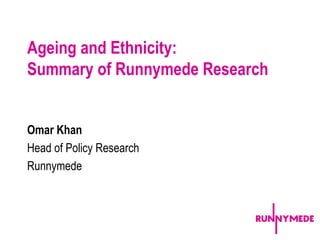Dr Omar Khan - Runnymede
- 1. Ageing and Ethnicity: Summary of Runnymede Research Omar Khan Head of Policy Research Runnymede 11
- 2. About Runnymede The Runnymede Trust is an independent race equality think tank. We generate intelligence for a multi-ethnic Britain through: ï§ High quality research and analysis ï§ Engaging communities and network building ï§ Policy engagement 22
- 3. Ageing, Ethnicity and Financial Inclusion 3 Year Programme 5 Research reports (4 on your memory stick; 5th in Jan 2013). 2 Films (of deliberative assemblies in London & Birmingham)
- 4. Future Ageing and Diversity: Background and consequences Background 1 BME population of all ages increasing; Older BME pop increasing. Presently mainly overseas-born. Background 2 Lower rates of employment and wages lead to greater risk of poverty Consequence 1 Future needs likely to be very different. Consequence 2 Policymakers, health and social care services and LAs need to plan now.
- 5. BME pop of all ages is increasing 35 25 30% 30 20 BME pop (millions) 25 20.7 BME pop as % 20 15 15 10 9% 10 5 5 4.5 0 0 2001 2016 2026 2051 % Million âĒ The Future Ageing of England and Wales
- 6. Older BME pop is increasing 3,000 2,700 2,500 Older BME pop (thousands) 2,000 1,940 1,500 1,000 230 500 130 0 2001 2011 2021 2031 2041 2051 65+ 70+ âĒ 12 and 14 times increase
- 7. BME people and pensioner poverty Risk of pensioner poverty by ethnicity, 2007-8 60 50 Risk of pensioner poverty (%) 40 30 20 10 0 White Pakistani & Black Caribbean Indian Chinese or other All Bangladeshi âĒ All (18%), Black Caribbean (30%), Pakistani & Bangladeshi (49%)
- 8. Why are BME people poor when older? âĒ Less likely to have pensionsâĶ White Ethnic minorities % with private pension (in employment) 53 39 All Ethnic minorities (2005-6) âĒ% building entitlement to S2P other assets â Less able to compensate with 75 65 âĒ Savings âĒ Home ownership % with no savings Black or Black British 63 Asian or Asian British 60 (2005) All 33
- 9. Low income and ethnicity Income poverty rate by ethnicity, 2002-5 White British White Other Indian Black Caribbean Black African Pakistani Bangladeshi 0 10 20 30 40 50 60 70 Income poverty rate (%) âĒ Bangladeshi (65%), Pakistani (55%), White British (20%) âĒ Reflects unemployment but also poor quality work
- 10. Retiring Overseas â Considerations âĒIncome and savings âĒFamily and friends âĒHealthcare costs â and quality âĒTax and benefits arrangements (e.g. âĒHealth (and climate!) âĒThe Costs of âReturning Homeâ 10 10
- 11. Retiring Overseas â Pensions Uprating and other recommendations âĒNo uprating in Africa, most of Asia and most of Caribbean, or Canada, Australia, South Africa âĒExceptions are Jamaica, Turkey, Philippines, Barbados âĒLoss of pension income estimated at ÂĢ24,000 over 20 years âĒBetter information âĒHealthcare arrangement and access to NHS âĒTo Stay or Not to Stay 11 11
- 12. Retiring in the UK: Rural and Care Concerns âĒUK born will not âreturnâ home âĒBME tend to live in urban areas; older people retire to country âĒPolicymakers and local officials must plan for future âĒThis includes catering to needs of ethnic minorities, e.g. community centres âĒCare homes should better cater for BME needs. Culturally competent care, including staff training âĒA Sense of Place 12 12
- 13. Rural Distribution in 2001, and 2051 Proportion living in rural UK in 2001 and 2051, by ethnicity 40 35 30 25 2001 20 2051 15 10 5 0 White Asian Black Chinese/Other Rural Distribution in 2001, and 2051 13 13
- 14. BME Care Home Population, 2011-2051
- 15. Care Home Residents: Indian older people
- 16. Grandparenting âĒ Report due in January 2013 âĒ Policymakers need to give greater attention to importance of informal care âĒ BME grandparents make large contribution. Government could consider reforming leave system âĒ Govt should tackle cultural barriers to improve uptake of formal childcare âĒ Govt needs to do more to encourage savings 16 16
- 17. Ethnicity and Ageing: diverse but uncertain future âĒ Increasing growth and diversity of BME older population âĒ But still evidence of greater poverty âĒ BME people live in urban areas, older people retire in rural or seaside areas. As the population increases and diversifies, will more BME older people move out of cities? âĒ Almost all older BME people today were born abroad, an increasing number will be British-born in future, with different decision-making. âĒ For policymakers, local authorities and indeed national agencies, the increased diversity and distribution of the future older population needs to be planned for today.
- 18. QuestionsâĶ? To discuss our research and work, please contact me at: ï§ omar@runnymedetrust.org ï§ 020 7377 9222 18


















